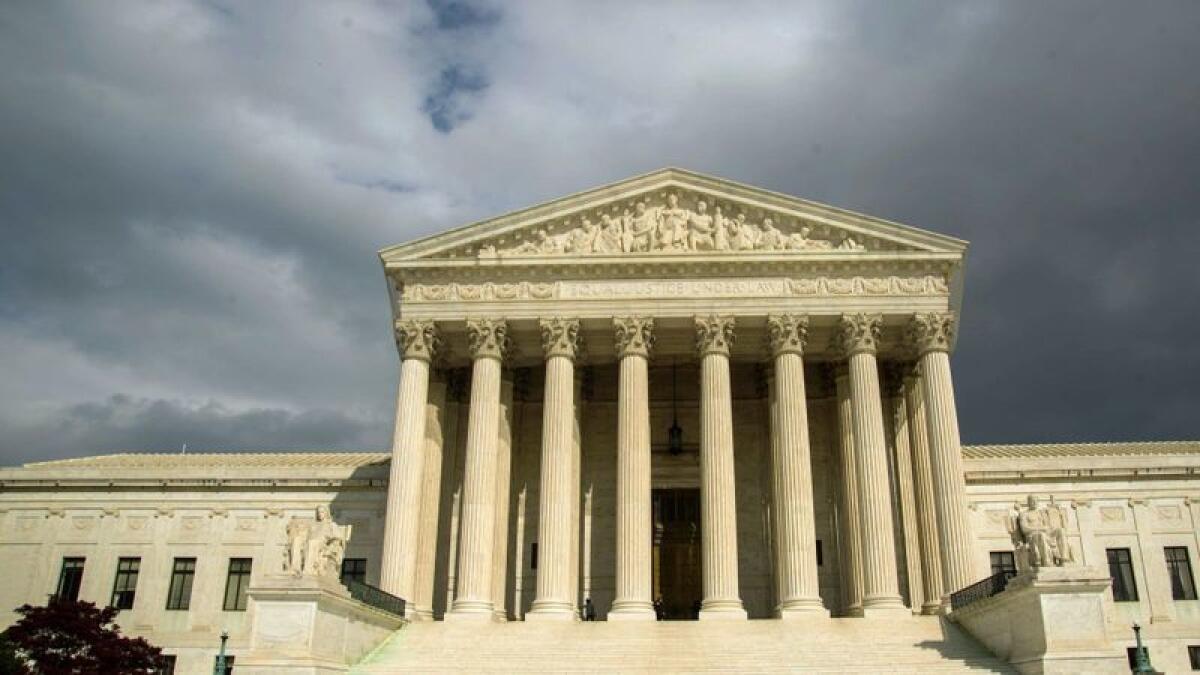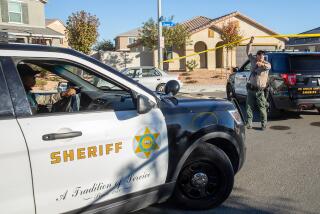Supreme Court lets stand $4-million verdict against L.A. County deputies in shooting

The Supreme Court on Monday let stand a $4-million verdict against two Los Angeles County sheriff’s deputies who were searching for a fugitive and mistakenly shot an innocent homeless couple sleeping in a shed behind a Lancaster home.
The justices, without comments or dissents, turned away an appeal from county lawyers who maintained the deputies responded reasonably in 2010 when one of the victims reached for what turned out to be a BB gun.
Angel Mendez was shot 10 times and lost a leg below the knee. His wife, Jennifer Mendez, was shot in the upper back and hand. They sued the deputies, alleging violations of their constitutional rights against unreasonable searches and seizures, and excessive use of force.
It took two trips through the federal courts to settle the case. A federal judge who heard the case ruled the two deputies, Christopher Conley and Jennifer Pederson, were liable for the shooting and awarded the couple $4 million. In upholding the verdict, the 9th Circuit Court of Appeals said the officers were liable because they had provoked the confrontation.
The officers had been pursuing a parole violator seen in the area, and they believed he may be hiding behind a house. They encountered the homeless couple in a shed, where a property owner was allowing them to sleep.
Two years ago, the Supreme Court set aside the judgment and told the 9th Circuit to reconsider the case. At that time, the justices said they were skeptical of the notion that police could be sued for having provoked a violent incident.
The decision was a rejection of the so-called provocation rule that had been adopted by the 9th Circuit.
But the 9th Circuit upheld the verdict again last year and said the deputies were liable for having entered the private property without a search warrant and for having burst into the shed without announcing their presence.
“Among the reasons why the 4th Amendment erects a barrier to entry is that an officer might, due to a mistaken assessment of the threat, harm a person inside a residence,” Judge Ronald Gould wrote for the appeals court. “Persons residing in a home may innocently hold kitchen knives, cellphones, toy guns or even real ones that could be mistakenly believed by the police to pose a threat…. Nothing about Mr. Mendez’s innocent actions warrants shifting responsibility for the subsequent shooting injuries away from the officers and to the shooting victim.”
This time, the Supreme Court without comment refused to hear a further appeal in Los Angeles County vs. Mendez.
It is possible the justices opted not to review the case because the 9th Circuit had made clear the officers had violated the 4th Amendment by entering the property without a search warrant and therefore were liable for the injuries to the couple. In addition, the appeals court said the officers were also liable under California law for “gross negligence,” and that finding alone could have been an independent justification for upholding the verdict.
The high court’s refusal to hear the case sets no national precedent. However, it keeps in place the 9th Circuit precedent, putting police in California and other Western states on notice that if they enter a home or property without a search warrant and with no evidence of an emergency, they may be held liable for the “foreseeable consequences” that follow.
“Especially where officers are armed and on alert, violent confrontations are foreseeable consequences of unlawful entries,” Judge Gould said.
It was a rare victory for victims of mistaken police shootings. The Supreme Court has been criticized for shielding police from being sued for shooting innocent people. The justices have often ruled that police are immune from being sued unless they violate “clearly established” law.
Leonard Feldman, a Seattle lawyer who represented the couple, said the court’s decision brings an end to the case. “The Mendezes can finally recover damages for the injuries that occurred over eight years ago when police unlawfully entered their home and shot them when they rose from a nap to see who had entered their home,” he said.
In a separate case Monday, Justice Brett M. Kavanaugh said he believed churches and religious organizations should have an equal right to obtain state grants that are available to other nonprofit groups and charities. He did so in a partial dissent as the court turned down a New Jersey case that raised the issue.
Two years ago, the high court broke new ground when it ruled that a Lutheran church in Missouri had a 1st Amendment “free exercise of religion” right to a state grant to resurface a school playground. But the justices said then in Trinity Lutheran vs. Comer they were deciding only on school playgrounds.
Last year, by contrast, the New Jersey Supreme Court ruled public funds may not be used for “historic preservation” of churches. It did so based on its state constitution, which says tax funds may not go directly to churches.
On Monday, the Supreme Court said it would not hear an appeal from the Morris County Board and the Presbyterian Church asking whether New Jersey’s rule violates the 1st Amendment. None of the justices dissented, but Kavanaugh wrote a five-page opinion saying the court will need to decide the issue.
“Barring religious organizations because they are religious from a general historic preservation grants program is pure discrimination against religion,” he wrote in Morris County vs. Freedom from Religion. Justices Samuel A. Alito Jr. and Neil M. Gorsuch agreed.
More stories from David G. Savage »
More to Read
Get the L.A. Times Politics newsletter
Deeply reported insights into legislation, politics and policy from Sacramento, Washington and beyond. In your inbox three times per week.
You may occasionally receive promotional content from the Los Angeles Times.







